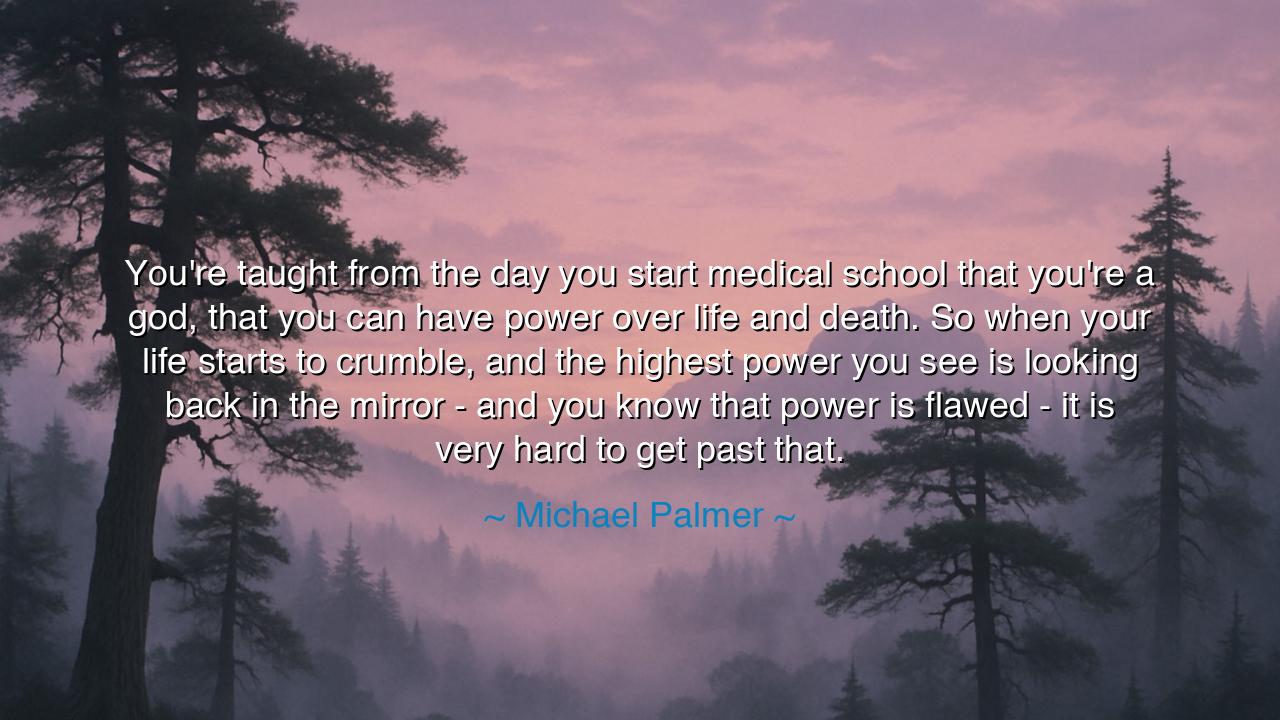
You're taught from the day you start medical school that you're a
You're taught from the day you start medical school that you're a god, that you can have power over life and death. So when your life starts to crumble, and the highest power you see is looking back in the mirror - and you know that power is flawed - it is very hard to get past that.






The words of Michael Palmer—“You're taught from the day you start medical school that you're a god, that you can have power over life and death. So when your life starts to crumble, and the highest power you see is looking back in the mirror—and you know that power is flawed—it is very hard to get past that”—reveal a profound truth about the illusion of human divinity. In his voice echoes the lament of countless healers and thinkers throughout time who, believing themselves the masters of life, were confronted by their own mortality. It is not a condemnation of pride, but a confession of awakening: when one sees that even the mighty are fragile, that even the healer must bleed, one begins to understand the true nature of wisdom.
In the ancient world, physicians were often revered as demigods—keepers of sacred knowledge, able to command the mysteries of flesh and spirit. From Asclepius in Greece to Hippocrates, and from the healers of Egypt to the scholars of the East, those who wielded medicine stood near the fire of creation itself. To restore life where death once lingered is to touch the threshold of the divine. Yet, Palmer’s words remind us that such proximity to power can also corrupt the soul. When man forgets that he is mortal, when he looks into the mirror and sees not a servant of life but its ruler, he begins the slow descent into despair.
There is a tale from the Renaissance of Paracelsus, the great physician who defied the old doctrines. He believed that within man lay the power to cure any ailment if only he understood nature’s hidden laws. He was bold, brilliant, and consumed by the fire of discovery. Yet in the end, it was not plague nor poison that undid him—it was pride. He could not accept that the same hand that healed could also err, that the same mind that uncovered truth could also wander into darkness. Like the mirror in Palmer’s quote, his own reflection became his greatest adversary: the realization that the god he saw in himself was flawed.
When Michael Palmer, himself a doctor and novelist, wrote these words, he spoke from experience, not abstraction. He knew the weight carried by those in white coats—the expectation to be perfect, unbreakable, almost divine. But when a doctor’s own spirit fractures, when their hands tremble or their heart falters, the myth of omnipotence crumbles. The healer meets the human beneath the robe, and it is a meeting both terrifying and redemptive. To see one’s own imperfection is to be reborn as a true servant of life, no longer a master of it.
The ancient sages taught that humility is not weakness but alignment with truth. The mountain stands tall not because it denies its shadow, but because it accepts it as part of its being. So too must the healer—and indeed, every human—embrace the reality that power without humility is destruction. To confront one’s own flaws is not to lose divinity, but to rediscover it in a higher form: compassion. For the one who knows his weakness becomes gentler with the weakness of others. The one who has faced his mirror without turning away becomes a better guide for those lost in their own.
Consider the story of Ignaz Semmelweis, the physician who discovered that washing hands could save countless mothers from fever and death. His revelation was divine in its simplicity, yet he was mocked, dismissed, and driven to madness by his peers. In his final years, as his mind decayed, he raged not against others but against himself—for he could not reconcile the grandeur of his discovery with the collapse of his soul. He had touched truth and burned. He had held power and broken beneath it. His tragedy stands as a warning that brilliance without inner balance becomes torment.
And so, the lesson of Michael Palmer’s words resounds like a bell through the ages: do not mistake knowledge for godhood, nor control for wisdom. The greatest healers, leaders, and creators are those who have seen their own limits and learned to walk with them as allies. When you look into the mirror and see imperfection staring back, do not despair. That reflection is your teacher. It tells you that you are human—and that being human, flawed yet striving, is holier than any illusion of godhood.
To those who carry responsibility—whether of life, leadership, or love—remember this: you are not meant to be gods. You are meant to be guardians. Tend the flame, but do not claim the fire. When your life begins to crumble, return to humility, to reflection, to compassion. The mirror will always show imperfection—but in that imperfection lies the doorway to grace, and the beginning of true healing for both yourself and the world.






AAdministratorAdministrator
Welcome, honored guests. Please leave a comment, we will respond soon